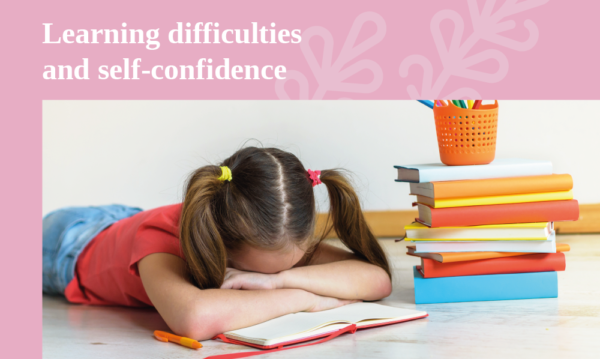There has been a lot of research showing that children with specific learning difficulties are at risk of having lower self-confidence and self-esteem than other students who do not have such problems. From a very young age, children are compared to each other in various areas, such as learning, making and maintaining friends, and sports skills.
A child with learning disabilities may judge himself as “dumb” or “slow,” comparing his academic performance with other children. This kind of self-criticism is usually generalized; that is, the child, who has difficulties in school, tends to evaluate himself in all development areas negatively.
Children with learning disabilities have often spent many years struggling at school and feeling “stupid.” They probably feel confused, discouraged, and desperate, as their efforts do not produce the desired results. Some children give up all effort because of multiple failures, develop so-called “learned helplessness,” and adopt the attitude “Why should I try if I always fail?”
Parents and teachers, therefore, must undo these negative self-assessments to start seeing themselves on a realistic basis:
Emphasize the child’s positive elements to boost their self-esteem: It is important to remember that although children may experience specific reading or math difficulties, they have many academic and non-academic possibilities that make them wonderful people. Sit down with your child, write a list of all his unique skills and talents, and stick it to his desk where he can read it every day. Encourage the child to harness these skills by participating in activities (for example, sports, music lessons, dance, or theatre) that will let him shine and enhance his confidence.
Let the child take the initiative and do not offer him everything ready: To enhance the child’s self-confidence, the child should become self-contained and feel responsible. Help the child with problem-solving and decision-making skills. Good problem-solving skills are associated with higher self-esteem. Instead of providing the child with a ready solution to every problem he faces (academic, social, etc.), help him apply the brainstorming technique for possible solutions and the potential consequences of different decisions. Avoid critical comments and praise the child for their effort. Often children with learning disabilities try hard to carry out their tasks without always having the expected result. Be aware of your child’s special learning needs and the frustration they experience during the learning process. Do not compare the child with learning difficulties with classmates or siblings.
Find opportunities to give the child the necessary positive attention and support throughout the day: Emphasize the child’s strengths in non-scientific areas, such as music, art, sports, etc. or emphasize the strengths of his personality (courtesy, perseverance, willingness, sense of humor, etc.).
Give the child multiple opportunities to help: Helping others helps the child realize that he has something to offer and is useful for family and community; children often enjoy participating in voluntary activities with their friends and family. Helping others boosts self-confidence.
Create a plan in collaboration with your child’s teacher: When the child is not doing so well at school, remember that teachers can work with children with learning disabilities and be close to them to help them reach their potential. Arrange regular meetings to discuss problems at home or school so that you and the teacher follow the same course. Agree on a plan that can be implemented at home, giving extra encouragement to complete the tasks, breaking the material into smaller pieces, or spending more time per day in the area where the child lags.
Seek help for the child with learning disabilities: You don’t have to deal with it yourself. There are professionals in many areas who specialize in helping children and adolescents with learning disabilities. A special needs’ educator can help the child find better and more creative ways to learn new information and provide extra help with the most challenging topics. Psychologists can also help treat the emotional and social challenges faced by children with learning disabilities.
It is good to have realistic expectations about the child’s performance because this will help him develop a sense of control. Working with each other, parents, and professionals will help the child with learning difficulties overcome academic difficulties and the impending difficulties in the child’s self-esteem and self-confidence. If we can assess the child with learning difficulties in a holistic way, the child will also learn to appreciate his unique powers.
References:
Dr. Sanford J. Silverman, (2010). Learning Disabilities: How to improve your child’s self-esteem
Aoife Lyons, Self-esteem and Learning Disabilities


